This site is supported by our readers. We may earn a commission, at no cost to you, if you purchase through links.

Start with three essentials: a mild cleanser, basic moisturizer, and broad-spectrum sunscreen. Look for hypoallergenic formulas containing soothing ingredients like niacinamide or hyaluronic acid. Avoid harsh scrubs, alcohol-based toners, and fragranced products that can worsen sensitivity.
Over-cleansing disrupts your natural protective layer, so stick to once or twice daily cleansing. The key is simplicity – complex routines often backfire with sensitive skin. Understanding which specific triggers affect your skin can transform your entire approach to daily care.
Table Of Contents
- Key Takeaways
- Key Causes and Symptoms of Sensitive Skin
- Essential Ingredients for Sensitive Skin Care
- Building a Gentle Skincare Routine
- Tailored Morning and Evening Routines
- Top 9 Skincare Products for Sensitive Skin
- 1. Gentle Daily Facial Skin Cleanser
- 2. Olay Regenerist Anti Aging Moisturizer
- 3. Aveeno oat gel facial moisturizer
- 4. Anew Ultimate Night Cream Travel Size
- 5. Clinique daily moisturizing face lotion
- 6. Olay Regenerist Face Moisturizing Cream
- 7. Anti Aging Daily Facial Moisturizer
- 8. Gentle Makeup Remover Cleansing Balm
- 9. No7 Anti Aging Face Serum
- Tips for Managing and Preventing Irritation
- Frequently Asked Questions (FAQs)
- How do I choose the best skincare for sensitive skin?
- What is good for severe skin sensitivity?
- How can I Make my sensitive skin care routine more effective?
- What should you do if your skin is sensitive?
- What is the best skin routine for sensitive skin?
- What is the best advice for sensitive skin?
- How can I get flawless skin for sensitive skin?
- What should I use on my face if I have sensitive skin?
- How does diet affect sensitive skin health?
- Can stress worsen sensitive skin reactions?
- Conclusion
Key Takeaways
- Start with three basics: Use a mild cleanser, simple moisturizer, and broad-spectrum sunscreen – you don’t need complex routines that often backfire with sensitive skin
- Choose fragrance-free, hypoallergenic products: They reduce skin flare-ups by up to 38% and won’t trigger the burning, stinging, or redness that sensitive skin experiences
- Avoid over-cleansing and harsh ingredients: Stick to cleansing once or twice daily with lukewarm water, and skip sulfates, artificial fragrances, and alcohol-based products that strip your natural protective barrier
- Patch-test everything first: Your skin’s reaction patterns will guide better product choices – test new items on your inner wrist before applying to your face to prevent painful reactions
Key Causes and Symptoms of Sensitive Skin
If you’ve noticed your skin reacting to products with redness, stinging, or burning sensations, you might’ve sensitive skin that requires special attention.
Understanding what triggers these reactions and recognizing the warning signs can help you choose the right products and avoid painful flare-ups.
Common Symptoms of Sensitive Skin
Recognizing sensitive skin symptoms helps you choose appropriate products and avoid unnecessary irritation. Your skin might react differently than others to common skincare ingredients and environmental factors.
Here are three key symptoms to watch for:
- Redness and burning sensations that appear after applying new products or exposure to environmental triggers
- Itchy patches that develop without obvious cause, often accompanied by dryness or flaking
- Immediate stinging when using typical cleansers or moisturizers that others tolerate well
These reactions signal your skin barrier needs extra protection. Understanding your sensitive skin type guides better product choices and helps maintain healthy skin health through gentler care routines.
Typical Causes of Sensitive Skin
Your skin barrier weakens due to genetic predisposition, environmental factors like pollution and harsh weather, hormonal changes during puberty or menopause, and nutritional deficiencies.
Over-cleansing disrupts your skin’s natural protective layer, while stress triggers inflammatory responses.
Understanding these causes helps you choose appropriate sensitive skin care products and follow dermatologist recommendations for ideal skin health.
How to Determine if You Have Sensitive Skin
Figuring out if you have sensitive skin doesn’t require a dermatologist visit. Start with simple Skin Type Tests at home. Notice Sensitive Skin Signs like stinging after applying products, redness from new skincare, or reactions to fragrances.
Your Irritation Threshold reveals itself through consistent patterns. Self Diagnosis Methods include patch testing products on your inner wrist. Monitor your Skin Reaction Analysis over time, noting triggers that affect your Skin Tone and Undertone.
Poor Skin Hydration often worsens sensitivity, making Sensitive Skin Care essential for maintaining healthy, comfortable skin.
Essential Ingredients for Sensitive Skin Care
When you have sensitive skin, choosing the right ingredients becomes your first line of defense against irritation and inflammation. Understanding which ingredients soothe and which ones trigger reactions helps you build a skincare routine that actually works for your unique needs.
Soothing Ingredients for Sensitive Skin
When you’re dealing with sensitive skin, choosing the right soothing ingredients can make all the difference. Hyaluronic Benefits include intense hydration without irritation, while Natural Oils like jojoba mimic your skin’s natural sebum. Gentle Exfoliants such as polyhydroxy acids work without stinging.
Soothing Serums containing niacinamide reduce redness effectively. Products like SkinCeuticals Soothing Cleanser and Aveeno Calm Restore deliver targeted relief for compromised barriers. Using a skin cream product can also provide essential moisture and comfort to sensitive skin.
Irritating Ingredients to Avoid
While beneficial ingredients help your skin, harmful components can trigger flare-ups and worsen sensitivity. Understanding which irritating ingredients to avoid protects your skin barrier and prevents unnecessary reactions.
Here are four major culprits to watch for:
- Artificial Fragrances – Found in 36% of adverse cosmetic reactions, these undisclosed chemical cocktails cause allergic contact dermatitis and stinging sensations in sensitive skin types.
- Harsh Chemicals like Sulfates – SLS and SLES strip your skin’s natural oils, contributing to 36% of dry skin cases and compromising your protective barrier with daily use.
- Paraben Dangers and Preservatives – Methylisothiazolinone and formaldehyde releasers account for over 20% of allergic contact dermatitis events, triggering eczema flare-ups in susceptible individuals.
- Synthetic Additives in Acids – Alpha hydroxy acids and retinoids cause burning sensations in 36.3% of users, leading to increased redness and barrier damage when overused.
Reading ingredient labels becomes your skincare detective work—protecting your skin from these common troublemakers helps maintain a healthy, comfortable complexion. To minimize skin irritation, this is critical to check for sensitive skin triggers in your skincare products.
Natural Alternatives for Sensitive Skin
Beyond conventional synthetic ingredients, herbal remedies offer gentle solutions for sensitive skin care. Plant extracts like chamomile and calendula provide anti-inflammatory benefits, while aloe vera delivers natural skin hydration without harsh chemicals.
| Natural Skincare Ingredients | Benefits for Sensitive Skin |
|---|---|
| Oat Extract & Colloidal Oatmeal | Soothes irritation, reduces redness |
| Chamomile & Green Tea | Anti-inflammatory, calming properties |
| Honey & Shea Butter | Natural moisturizing, barrier protection |
Essential oils require careful dilution, as concentrated forms can trigger reactions. Natural masks using cucumber or yogurt provide skincare for dry skin relief. These plant-based alternatives work gently with your skin’s natural processes, offering effective skin care advice without synthetic irritants.
Key Ingredients: Hyaluronic Acid, Niacinamide, Vitamin C
Among the superstar trio for sensitive skin solutions, hyaluronic acid stands out by boosting hydration 20% within two weeks. Niacinamide effects include reducing redness up to 60% while strengthening your skin’s protective barrier. When choosing a vitamin c serum, opt for concentrations below 10% to avoid stinging. Together, these ingredients create the perfect acid balance for your skincare routine.
Using natural ingredients with skin care benefits can further augment the effectiveness of these products.
Building a Gentle Skincare Routine
When you have sensitive skin, building an effective routine means choosing fewer, gentler products that won’t trigger irritation.
Studies show that fragrance-free formulations reduce skin flare-ups by up to 38%, making them essential for your daily regimen.
Fragrance-Free and Hypoallergenic Options
When choosing skincare products for sensitive skin, you’ll want fragrance-free and hypoallergenic formulas that won’t trigger reactions. Dermatologists recommend avoiding fragranced products since they can reduce skin flare-ups by up to 38%. Products like Cetaphil Daily Facial Cleanser and Aveeno Calm Restore offer gentle formulas designed for sensitive skin types without common allergens or irritants.
Understanding hypoallergenic skincare is essential for selecting the right products to minimize skin irritation.
Minimizing Steps in Your Routine
Simplified routines work better for sensitive skin than complex regimens. Start with just three products: a gentle face cleanser, moisturizer, and sunscreen. This simplified approach reduces irritation risk while maintaining effective skin care.
Minimal products mean fewer potential triggers, making efficient skincare achievable for everyone with sensitive skin conditions.
Tailored Morning and Evening Routines
Creating a customized routine for sensitive skin requires understanding your unique triggers and timing your products strategically. You’ll need different approaches for morning protection and evening repair to optimize benefits while minimizing irritation risk.
Gentle Cleansing for Sensitive Skin
Cleansing doesn’t have to feel like scrubbing dishes—your sensitive skin deserves the gentle touch. Choose fragrance-free face cleansers that won’t trigger irritation or compromise your skin’s protective barrier. When selecting a cleanser, consider using a gentle face cleanser to maintain healthy skin.
- Cleanser Types: Opt for cream or lotion-based formulas over foaming varieties
- Gentle Exfoliants: Skip harsh scrubs; use soft washcloths for light physical exfoliation
- Facial Massage: Apply cleanser with light, circular motions for 30 seconds maximum
- Soothing Toners: Follow cleansing with alcohol-free, pH-balanced toners to restore skin balance
Moisturizing and Sunscreen for Sensitive Skin
Hydration forms your skin’s first line of defense against environmental stressors. Apply moisturizer within three minutes after cleansing to lock in moisture and strengthen your skin barrier. Choose fragrance-free formulas with ceramides and hyaluronic acid for ideal skin hydration and barrier repair. When selecting sunscreens, consider using products with sensitive skin friendly ingredients to minimize irritation.
| Moisturizer Types | Key Ingredients | Application Tips |
|---|---|---|
| Morning Formula | Hyaluronic acid, SPF 30+ | Apply upward motions, neck included |
| Evening Cream | Ceramides, shea butter | Gentle patting, avoid eye area |
| Sensitive Skin Sunscreens | Zinc oxide, titanium dioxide | Reapply every 2 hours outdoors |
| Daily Hydration Routines | Glycerin, aloe vera | Twice daily for consistent protection |
Gentle Exfoliation and Nourishment at Night
Evening care for sensitive skin requires patience—think “less is more.” Use gentle exfoliants like lactic acid weekly, never daily. Sensitive skin masks with oat or chamomile calm irritation overnight. Apply overnight moisturizers with ceramides for deep skin hydration while you sleep.
Your nighttime skincare routine should focus on repair, not aggressive treatment. Understanding the importance of a nighttime skin care routine helps in achieving healthy skin health.
Top 9 Skincare Products for Sensitive Skin
Finding the right products for sensitive skin doesn’t have to feel like traversing a minefield. These nine dermatologist-recommended products are specifically formulated to cleanse, hydrate, and protect delicate skin without triggering irritation or flare-ups.
1. Gentle Daily Facial Skin Cleanser

First on your sensitive skin arsenal should be Cetaphil Daily Facial Cleanser, a dermatologist-favorite that’s clinically tested to remove dirt and makeup without leaving skin dry or tight. This hypoallergenic, non-comedogenic formula reinforces your skin’s moisture barrier while deep cleaning without clogging pores.
Its gentle foaming action works morning and night, leaving skin refreshed and soft. With 86% of testers continuing use, it’s proven effective for combination and sensitive skin types seeking reliable daily cleansing.
Best For: People with sensitive or combination skin who need effective daily cleansing without dryness or irritation.
- Clinically tested hypoallergenic formula that won’t clog pores or strip natural oils
- Gentle enough for twice-daily use while effectively removing makeup and impurities
- Reinforces skin’s moisture barrier and leaves skin soft rather than tight
- Can be slightly drying for some users, requiring follow-up moisturizer
- Unscented formula may lack the sensory experience some prefer
- Foaming action might feel less luxurious than cream-based cleansers
2. Olay Regenerist Anti Aging Moisturizer
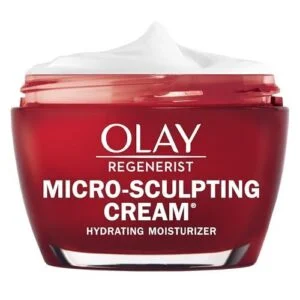
Choosing an anti-aging moisturizer for sensitive skin can feel like walking a tightrope. Olay Regenerist Anti Aging Moisturizer delivers impressive results without the drama.
Clinical studies show 21% increased skin firmness and 15% wrinkle reduction in eight weeks. The fragrance-free formula contains niacinamide, amino-peptides, and hyaluronic acid—proven ingredients that boost hydration by 40%.
With 4.7/5 ratings and 92% reporting no irritation, it’s your skin’s new best friend.
Best For: Women with sensitive skin seeking clinically-proven anti-aging results without irritation or harsh reactions.
- Clinical studies show 21% increased skin firmness and 15% wrinkle reduction in 8 weeks
- Fragrance-free, hypoallergenic formula with 92% of users reporting no burning or tingling
- Lightweight texture absorbs quickly without greasy residue, making makeup application smoother
- Small 1.7 oz size may require frequent repurchasing compared to larger moisturizers
- May be too rich or thick for some users with very oily skin types
- Higher price point due to premium anti-aging ingredients compared to basic moisturizers
3. Aveeno oat gel facial moisturizer
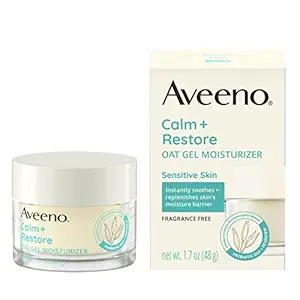
Specifically formulated for sensitive souls battling irritation, Aveeno’s oat gel facial moisturizer delivers clinical-grade relief without the drama. This fragrance-free formula contains prebiotic oat and feverfew—nature’s own anti-inflammatory powerhouses that calm redness and strengthen your skin barrier.
You’ll get 48 hours of moisture retention in a lightweight gel that won’t clog pores or pill under makeup. Clinical studies show 92% of users felt instant relief, making this your gentle guardian against daily irritants.
For ideal results, consider using products with sensitive skin ingredients that promote a healthy skin barrier.
Best For: People with sensitive, dry, or irritation-prone skin who need gentle daily hydration without clogging pores or causing reactions.
- Clinically proven 48-hour moisture retention with 92% of users experiencing instant soothing relief
- Fragrance-free, hypoallergenic formula with prebiotic oat and feverfew that strengthens skin barrier and reduces redness
- Fast-absorbing gel texture that works well under makeup and other skincare products without pilling
- Small 1.7 oz container size may not provide good value for the price point
- Some users may experience mild tingling sensation when first applying to very sensitive areas
- Gel texture may not feel moisturizing enough for those who prefer richer, creamier formulas
4. Anew Ultimate Night Cream Travel Size
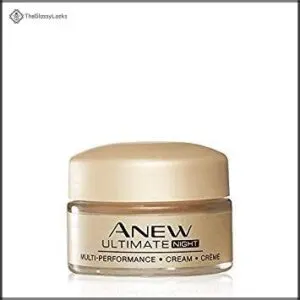
Your skin deserves a gentle nighttime treat that won’t cause morning regret. Anew Supreme Night Cream delivers clinically proven results with its hypoallergenic, dermatologist-tested formula.
The vegan cream’s Celluvive Complex targets aging signs while glycerin provides deep hydration without clogging pores.
Clinical studies show 100% of testers experienced improved skin tone within weeks.
You’ll notice firmer skin on your face, jaw, and neck after consistent nightly use.
The travel size lasts about one month when applied sparingly.
Best For: Adults with mature, sensitive skin seeking a gentle yet effective anti-aging night cream that improves firmness, texture, and skin tone without causing irritation.
- Clinically proven results with 100% of testers showing improved skin tone within weeks
- Hypoallergenic, vegan formula suitable for sensitive skin without parabens, sulfates, or phthalates
- Multi-benefit formula targets firmness, fine lines, hydration, and overall skin texture in one product
- Limited 0.5 oz travel size only lasts about one month with nightly use
- May not effectively fade age spots or sun damage (results vary by individual)
- Currently on waiting list at Avon, indicating potential stock availability issues
5. Clinique daily moisturizing face lotion
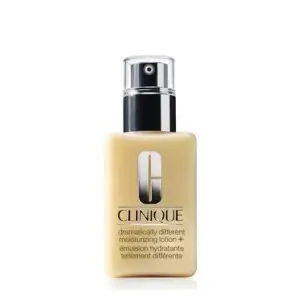
Frequently praised by dermatologists, Clinique’s daily moisturizing lotion delivers outstanding barrier strengthening—boosting skin protection by 21% within just two hours. This fragrance-free formula combines glycerin and urea to lock in moisture for up to eight hours, making it a reliable ally for sensitive skin.
Clinical trials show 54% improvement in moisture retention, while hyaluronic acid acts like a moisture magnet. The lightweight texture absorbs quickly without residue, earning approval for post-procedure use and broad skin compatibility.
Best For: People with dry, sensitive, or combination skin seeking fragrance-free daily hydration that strengthens the skin barrier without causing irritation.
- Clinically proven to strengthen skin barrier by 21% in 2 hours and improve moisture retention by 54%
- Fragrance-free, hypoallergenic formula suitable for sensitive skin and post-procedure use
- Lightweight texture with 8-hour hydration that absorbs quickly without greasy residue
- Higher price point compared to drugstore moisturizers
- May not provide enough hydration for extremely dry skin types
- Some users report breakouts or find the formula inadequate for their specific skin needs
6. Olay Regenerist Face Moisturizing Cream
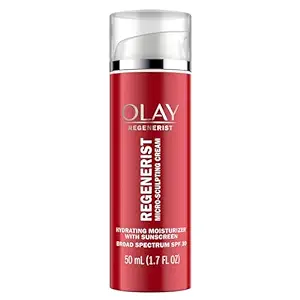
With amino-peptides working like tiny skin architects, this fragrance-free formula rebuilds your complexion from within. Clinical studies show 97% improvement in skin smoothness after four weeks, while 93% of users report lasting hydration throughout the day.
The hypoallergenic cream contains niacinamide to calm inflammation and hyaluronic acid for deep moisture. You’ll appreciate its lightweight texture that absorbs quickly without greasiness, making it perfect for layering under makeup or sunscreen without pilling.
Best For: People with sensitive or dry skin seeking an anti-aging moisturizer that provides hydration, reduces fine lines, and works well under makeup without irritation.
- Clinically proven results with 97% improvement in skin smoothness and 93% lasting hydration
- Fragrance-free, hypoallergenic formula with niacinamide that’s gentle on sensitive skin
- Lightweight, fast-absorbing texture that layers well under makeup and sunscreen without pilling
- May be too heavy for oily skin types who don’t need additional moisturizing properties
- Some users experience eye irritation, requiring careful application around the eye area
- Results vary between individuals, with some users not seeing noticeable improvements in skin texture
7. Anti Aging Daily Facial Moisturizer
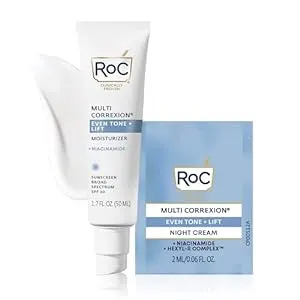
Your facial moisturizer doesn’t have to choose between youth and gentleness. Anti-aging daily moisturizers with SPF 30 protection offer clinically proven wrinkle reduction while respecting sensitive skin’s needs.
Look for formulas containing niacinamide and ceramides—ingredients that strengthen your skin barrier while delivering results. Dermatologist-tested, non-comedogenic options provide deep hydration without triggering flare-ups.
Apply consistently morning and evening for ideal anti-aging benefits without the irritation drama.
Best For: People with sensitive skin who want anti-aging benefits and sun protection in one gentle, daily-use moisturizer.
- Contains clinically proven anti-aging ingredients like niacinamide and Hexyl-R Complex that reduce wrinkles while being gentle on sensitive skin
- Provides SPF 30 protection against UVA/UVB rays, eliminating the need for separate sunscreen application
- Non-comedogenic and dermatologist-tested formula won’t clog pores or cause breakouts
- New plastic tube packaging is lower quality than previous glass bottle and pump mechanism can break easily
- Some users report an “off” smell from the plastic packaging that affects product experience
- May feel slightly oily or greasy on skin despite being labeled as non-greasy formula
8. Gentle Makeup Remover Cleansing Balm
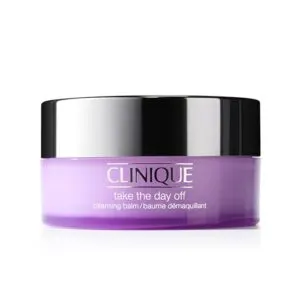
At day’s end, removing makeup becomes essential for sensitive skin health. Cleansing balms offer a gentle alternative to harsh makeup removers that can trigger irritation. These balm-to-oil formulas dissolve waterproof mascara and long-wear foundation without aggressive rubbing.
Look for fragrance-free options with ceramides and natural oils like jojoba. Clinical studies show 95% effective makeup removal while maintaining skin barrier function. The silky texture transforms from balm to oil, requiring only lukewarm water to rinse clean without residue.
Best For: People with sensitive skin who need gentle yet effective makeup removal, especially those prone to irritation from traditional cleansers.
- Removes 95% of waterproof makeup and sunscreen without harsh rubbing or irritation
- Fragrance-free, dermatologist-tested formula safe for sensitive eyes and skin
- Transforms from balm to oil for easy application and rinses clean without greasy residue
- May require double cleansing with a gentle cleanser for optimal results
- Texture can feel unusual or Vaseline-like initially for some users
- Higher price point compared to traditional makeup removers
9. No7 Anti Aging Face Serum
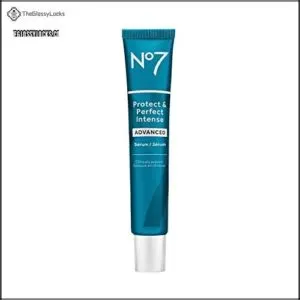
When you’re dealing with sensitive skin that’s showing signs of aging, No7’s Future Renew Serum offers clinically proven results without harsh irritation. This powerhouse formula combines hyaluronic acid, niacinamide, and peptides to tackle wrinkles while respecting your skin’s delicate nature.
In clinical trials, 97% of women saw improvements in multiple damage signs. The fragrance-free, hypoallergenic formula means you can fight aging without triggering flare-ups—finally, a serum that doesn’t make you choose between effectiveness and comfort.
Best For: People with sensitive skin looking for effective anti-aging treatment without irritation or harsh chemicals.
- Clinically proven results with 97% of users seeing improvements in multiple signs of skin damage
- Fragrance-free and hypoallergenic formula specifically designed for sensitive skin types
- Contains powerful ingredients like hyaluronic acid, niacinamide, and peptides for comprehensive anti-aging benefits
- Results may take several weeks to become visible, requiring patience and consistent use
- Higher price point compared to basic drugstore anti-aging serums
- Some users reported packaging issues with products arriving damaged or open
Tips for Managing and Preventing Irritation
Managing sensitive skin effectively requires understanding your triggers and implementing protective strategies. Quick interventions and lifestyle adjustments can substantially reduce irritation episodes while supporting your skin’s natural barrier function.
Avoiding Common Irritants and Triggers
Your skin’s worst enemies often hide in plain sight. Fragrances cause 30-45% of cosmetic allergic reactions, making fragrance avoidance essential for sensitive skin triggers.
Choose irritant-free products with gentle formulas to support your skincare routine. Avoid harsh alcohols, sulfates, and synthetic materials that disrupt your skin tone.
Simple trigger reduction through careful moisturizer selection creates lasting comfort.
Quick Fixes for Sensitive Skin
When irritation strikes, you need immediate relief without making things worse. Cool compresses provide instant comfort by reducing inflammation and calming angry skin. These quick interventions help restore balance to your skincare routine while your skin heals. Understanding sensitive skin care is essential for effective management and prevention of irritation.
- Apply Aveeno Calm Restore oat gel moisturizer for instant cooling relief on irritated patches.
- Use soothing masks with chamomile or aloe vera for 10-15 minutes to reduce redness.
- Try calming treatments like cool milk compresses to neutralize inflammation and provide fast relief.
Lifestyle and Dietary Changes
Your diet affects your skin more than you might think. Up to 70% of people with sensitive skin experience flare-ups from dietary triggers like spicy foods and alcohol.
Focus on omega-3 rich foods such as salmon and chia seeds to reduce inflammation. Stay hydrated with at least 2 liters of water daily, and load up on antioxidant-rich fruits and vegetables for ideal nutrient balance and healthier skin.
Stress Management for Sensitive Skin
Beyond the surface of sensitive skin lies a deeper connection to your emotional well-being. Chronic stress disrupts your skin barrier, making flare-ups more frequent and intense.
- Mindful Skincare: Practice skin meditation while applying Aveeno Calm Restore, focusing on gentle, intentional movements
- Emotional Triggers: Identify stress patterns that worsen sensitivity through daily journaling
- Relaxation Techniques: Use deep breathing exercises to lower cortisol levels and reduce inflammation
- Calming Routines: Establish consistent bedtime rituals that support skin barrier protection
- Professional Support: Consider psychodermatology for thorough skin care advice addressing stress-induced sensitivity
Frequently Asked Questions (FAQs)
How do I choose the best skincare for sensitive skin?
Choose fragrance-free, pH-balanced products and patch-test everything first. Dermatologists recommend avoiding scented cleansers since they cause 38% more flare-ups. Use lukewarm water and don’t over-cleanse—your skin barrier will thank you.
What is good for severe skin sensitivity?
When your skin’s fortress crumbles under severe sensitivity, you’ll need fragrance-free cleansers and pH-balanced products.
Choose unscented moisturizers, patch-test everything, use lukewarm water, and avoid over-cleansing to protect your delicate skin barrier effectively.
How can I Make my sensitive skin care routine more effective?
You’ll boost effectiveness by patch-testing all products first, using lukewarm water only, and sticking to fragrance-free formulas. Gentle pH-balanced cleansers and consistent application make all the difference.
What should you do if your skin is sensitive?
Despite thinking sensitive skin means you can’t use effective products, you actually can with the right approach.
Choose fragrance-free, pH-balanced cleansers and moisturizers. Patch-test new products first, use lukewarm water, and avoid over-cleansing to prevent irritation.
What is the best skin routine for sensitive skin?
Start gently with fragrance-free cleansers and lukewarm water to avoid irritation. Use pH-balanced products, moisturize consistently, and patch-test new items. Less is more—over-cleansing strips your skin’s natural barrier, causing flare-ups.
What is the best advice for sensitive skin?
While harsh cleansers strip your skin’s defenses, gentle care builds resilience. You’ll want fragrance-free products since they reduce flare-ups by 38%.
Choose pH-balanced cleansers, avoid over-washing, and use lukewarm water to prevent irritation.
How can I get flawless skin for sensitive skin?
Choose fragrance-free, pH-balanced cleansers and moisturizers. Patch-test new products first. Use lukewarm water, avoid over-cleansing, and apply gentle products consistently.
Consider microbiome-balancing serums to strengthen your skin barrier for lasting improvement.
What should I use on my face if I have sensitive skin?
Your sensitive skin deserves gentle care, not a skincare battlefield! Use fragrance-free cleansers and pH-balanced products. Choose unscented moisturizers, patch-test everything first, and cleanse with lukewarm water to minimize irritation.
How does diet affect sensitive skin health?
Diet impacts sensitive skin through inflammatory foods like dairy, sugar, and processed items that can trigger flare-ups.
Anti-inflammatory foods rich in omega-3s, antioxidants, and probiotics support your skin barrier and reduce reactivity naturally.
Can stress worsen sensitive skin reactions?
Ever wonder why your skin flares up during finals week? Stress absolutely worsens sensitive skin reactions by triggering cortisol release, which increases inflammation and compromises your skin barrier, making you more susceptible to irritants and allergic responses.
Conclusion
Transforming your skin from perpetually irritated to perfectly calm isn’t impossible—it just requires dedication to the right skincare tips for sensitive skin. You’ve learned that gentle, fragrance-free products paired with a simplified routine can dramatically reduce reactions.
Remember, consistency trumps complexity every time. Patch-test new products, listen to your skin’s signals, and don’t rush the process. Your compromised barrier needs time to heal and strengthen with proper care.








